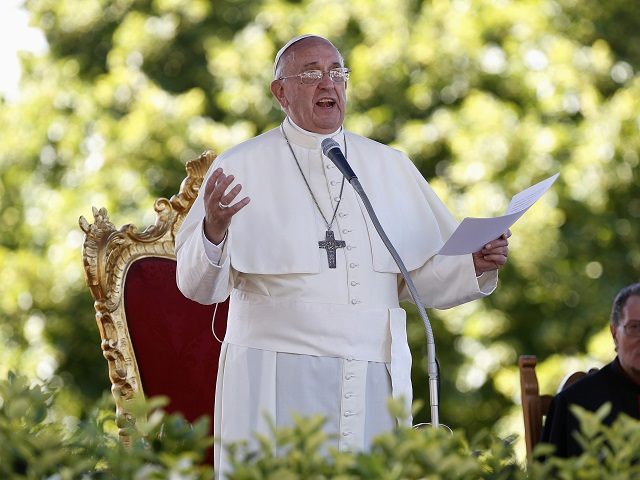A Vatican insider asserts that Pope Francis has scrapped the draft of his encyclical letter on the environment and sent it back for major revision. The letter was slated for publication in early summer, but now may not be ready until much later, he suggests.
Citing sources within the Santa Marta residence where the Pope lives, veteran Vatican journalist Sandro Magister has written that “Francis has scrubbed the draft” of the text presented to him by Argentinian Archbishop Víctor Manuel Fernández, perhaps foreseeing that Cardinal Gerhard Müller of the Congregation for the Doctrine of the Faith “would have demolished it” once it was presented to him for approval.
Though Magister has not always gotten it right, he has broken a good number of important stories over the years, including Pope Francis’ decision to remove Cardinal Raymond Burke from his post as head of the Vatican’s highest court.
Magister asserts that Fernández, who is the rector of the Universidad Católica Argentina in Buenos Aires, is the Pope’s number one ghostwriter, having begun writing for the Pope when he was still archbishop of Buenos Aires. The journalist claims that Fernández was responsible for drafting the 2013 “apostolic exhortation” Evangelii Gaudium and was subsequently assigned the task of composing the new letter on the environment in March 2014.
One Vatican official told Breitbart News that he had heard nothing of plans to table the papal encyclical and would be very surprised to see anything of the sort at this late date. Recently, Vatican spokesman Father Federico Lombardi tried to quash what he called “rumors and fantasies” about delays of the encyclical, saying that such speculation was “totally unfounded” and that it “seems almost unbelievable that such things are written.”
Just days ago, Honduran Cardinal Oscar Rodriguez Maradiaga, a close adviser to Pope Francis, lashed out at U.S. climate change skeptics who have expressed concern over the Pope’s apparent embrace of a UN ecological program closely allied to its population control activities.
Maradiaga lambasted “movements in the United States” that have expressed criticism of the Pope’s upcoming encyclical letter on the environment, calling it “absurd” to disparage a text that has not yet been released.
“The ideology surrounding environmental issues is too tied to a capitalism that doesn’t want to stop ruining the environment because they don’t want to give up their profits,” the cardinal said during a press conference Tuesday afternoon.
Critics have hastened to point out that Maradiaga’s knowledge of environmental issues seems rather thin at best.
This past week, the cardinal challenged the debate swirling around the scientific basis for human-induced climate change. “It’s enough to ask the taxi driver who brought me here,” he said, “to see that the temperature in Rome isn’t typical of springtime. Or just look at the fact that there have already been 21 typhoons in the Philippines this year and in California they are rationing water and you will understand that this argument must be taken seriously.”
In April, the Pontifical Academy of Science, under the leadership of progressive Argentinian Bishop Marcelo Sanchez Sorondo, invited a group of like-minded thinkers to meet at the Vatican for a workshop on climate change.
Their final statement made a series of dramatic proclamations on the environment, declaring that “human-induced climate change is a scientific reality” and that “its decisive mitigation is a moral and religious imperative for humanity.”
Just prior to the workshop, a group of 90 prominent scientists, religious leaders, and academics published an open letter to Pope Francis, urging him to entertain the scientific and moral arguments against current climate change theories.
While professing their appreciation for the Pope’s efforts on behalf of the environment and his commitment to the Judeo-Christian principle of “responsible stewardship” for creation, the writers suggested that the people closest to him may not be providing him with all the facts regarding climate change.
The authors argued that contrasting worldviews have led to sloppy reporting of the facts, driven by an ideological agenda. “Rather than a careful reporting of the best evidence,” they wrote, “we get highly speculative and theory-laden conclusions presented as the assured results of science. In the process, science itself is diminished, and many well-meaning moral and religious leaders risk offering solutions based on misleading science.”
Many conservatives have expressed concern that if the Pope were to take a rigid stand in favor of human-induced global climate change in his encyclical letter, he may compromise papal authority by canonizing scientific theories and political programs based on projections and computer-generated models, which have proven notoriously inaccurate in the past.
They also fear that many of the environmental “experts” who surround the Pope endorse population control measures inconsistent with Catholic teaching.
Follow Thomas D. Williams on Twitter @tdwilliamsrome.

COMMENTS
Please let us know if you're having issues with commenting.